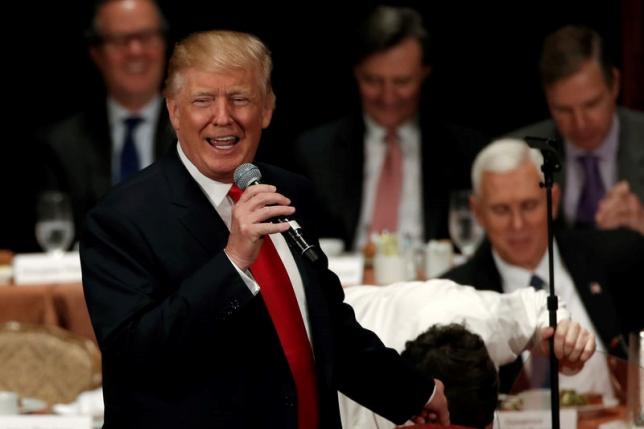Forget American religious freedom concerns. Freedom is threatened, period

As Donald Trump signed an executive order providing religious groups with additional protections in politics and in matters regarding LGBT individuals, the U.S. House of Representatives narrowly passed the American Health Care Act (AHCA) that many had not read. The 'health' bill, which has been sharply criticised for raising rates, eliminating the ACA's life-saving pre-existing condition provisions, and doling out tax breaks to the wealthy, was hardly criticised by religious conservatives or Trump's circle of religious advisors because they were duped by the smoke screen of his executive order and the far more sinister implications of the AHCA and the functioning of American democracy.
The events of May 4 offer a kind of microcosm of the Trump administration and why it may be so dangerous for our freedom in the months to come. Throughout his campaign and now presidency, Trump has more or less thrown table scraps to his religious supporters so that they have tiny victories to proclaim to their supporters. While cooler-headed political analysts noted that the 'religious liberty' executive order hardly touched on all of the topics its original writers had in mind, it enabled one Christian media outlet to declare: 'Trump Restores Religious Rights and Protects Pastors'.
The point of the executive order for Trump and his Republican allies wasn't protecting pastors or even addressing all of the concerns of religious leaders. He simply needed to reassure his religious base that he's working for them while passing his far more sinister health bill.
The AHCA is bad news in part because of the virtual death sentence that it passes on those with pre-existing conditions and the significantly higher costs for pregnant women and Americans over 50. However, the greater concern is that the government of a representative democracy worked around the clock to pass legislation that will harm its citizens without hardly a care about reelection.
While rumours swirl and investigations continue behind closed doors about Russia's meddling in the 2016 election, there is an abundance of information in the public record about the Republican strategy moving forward. The members of Congress voted for a strikingly cruel and harmful healthcare bill because they believe they can use diversion, voter removal, and voter suppression to get elected in the future.
I first learned about voter suppression while living in Ohio, a key swing state in most presidential elections. Polling hours and locations were being cut dramatically in many areas with minority populations, including early voting hours and locations that had proven critical for those unable to take time off from work to vote during the week. Politicians attempted to by-pass the proposals of independent commissions to redraw district lines in order to concentrate Demographic voters and to expand the influence of Republicans.
In southern states, such as Alabama, there are reports that the state closed Department of Motor Vehicle registration locations in minority areas after passing tougher voter ID requirements. Indeed, claims of voter fraud are largely manufactured to hide the greater problem of voter suppression in America.
Swing states such as Ohio have been especially concerning. North Carolina has cut access to early voting and has even been criticized for undermining democracy for its citizens. Arizona allegedly turned away thousands of registered voters.
States, such as Pennsylvania blocked access to voting machine recounts. While those present for the recount in Michigan report being intimidated from doing their work. Voter registration was only extended in Georgia when a judge ruled in its favor. There are a reported 20 states with restrictive voting laws.
Even more concerning in light of the 2016 election is the possibility of hacking in voting machines. The vulnerability of voting machines has been highlighted by many. Conveniently, in February, a house committee voted to eliminate the agency that oversees the hacking of voting machines.
All of these concerns about voter suppression hardly touch on the flood of special interest money since the passage of Citizens United and the rise of corporate lobbying. Corporations in America can, more or less, legally bribe politicians to address their concerns ahead of the American people. The AHCA fits the bill for this emerging American oligarchy by primarily serving the interests of the wealthiest Americans.
Trump and his Republican colleagues believe they have a winning formula for at least the near future. Religious supporters can be placated by passing relatively toothless measures related to religious freedom. Elections can be influenced through suppression tactics. Corporations will supply the campaign funds they require.
The irony is particularly striking for me after growing up in a pro-life Republican household and voting for George W. Bush in 2004. By every possible measure, the AHCA is going to hasten the death and/or financial ruin of many Americans. The freedom of many Americans is being undermined by Republican voter suppression efforts. And yet, this party claims to be the standard bearer for religious liberty and life.
While a major change in direction for the Republican party is desperately needed, significant legal action to restore our election system may be more urgent before the 2018 mid-term elections.
Ed Cyzewski is the author of A Christian Survival Guide and Pray, Write, Grow. He writes at www.edcyzewski.com and is on Twitter as @edcyzewski.











